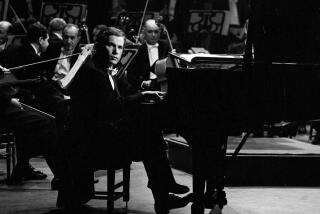Galway in a Light, Generous Recital
- Share via
People noticed when Herbert von Karajan hired young Irishman James Galway as principal flutist for the Berlin Philharmonic in 1969, and even more so when Galway left six years later to launch a solo career. Now turning 60 in December, the man with the golden flute returned to Royce Hall on Thursday evening as loose, as genial and as individual as ever.
Since going solo, Galway has been releasing records at a two-a-year clip, and BMG has culled a 15-CD set to celebrate the milestone year. However, little of the breadth of that prodigious discography--which ranges from Bach with period instruments to concertos by Lowell Liebermann, with crossover projects from Latin jazz to mainstream pop--was apparent Thursday.
Instead, Galway relied on familiar pieces in transcriptions and arrangements. He opened with reasonably idiomatic versions of Schubert’s beloved Arpeggione Sonata and Dvorak’s Opus 100 Violin Sonatina, and closed with Borne’s omnipresent “Carmen” Fantasy.
Of course, he played them gloriously, limber of line and gleaming in sound. Register does not define Galway’s range of color--he loves to repaint a phrase, going from dark, earthy shading to luminous purity. He also has an acute sense of musical perspective, of foreground and background within a single line that imbues his most casual playing with rare dimensionality.
Not coincidentally, he enjoys the fully engaged support of a longtime collaborator, pianist Phillip Moll. Indeed, it was Moll, round of tone but firmly articulate, who established the context for their seriously affecting Schubert. Only in the Dvorak finale did their efforts miss consistent connection and reflection.
The main exception on this slate of arrangements was “Opus di Jazz” by veteran sideman and producer Mike Mower, who was present to take a bow. A three-movement sonata with a much harder edge than the similar jazz-classical pieces of Claude Bolling, “Opus di Jazz” has both substance and charm. It may be slightly over-ripe in the central ballad, but it goes out bopping in style.
Saint-Saens’ dreamy Romance and much easy banter--few musicians seem as unfeignedly happy on stage as Galway--filled out the scheduled program. For his first encore, he brought out his wife, Jeanne Galway, for a showy, tuneful duo by Franz Doppler. Phil Coulter’s “Lament of the Wild Geese,” “Danny Boy” and “The Flight of the Bumblebee” completed a light but generous evening.
More to Read
The biggest entertainment stories
Get our big stories about Hollywood, film, television, music, arts, culture and more right in your inbox as soon as they publish.
You may occasionally receive promotional content from the Los Angeles Times.










